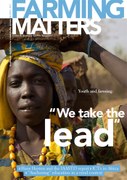AUTHOR
Month: March 2011
Articles
 “WE TAKE THE LEAD”
March 20th, 2011
“WE TAKE THE LEAD”
March 20th, 2011
Farming Matters | 27.1 |March 2011 Did you know that we are in the International Year of Youth? We are, since 12 August 2010. This issue of Farming Matters shows that young people are, and have, the future in agriculture worldwide. It considers the roles, priorities and responsibilities of young generations. Read how they can contribute … Read more
 The starting point: Youth’s perceptions about sustainable agriculture
March 20th, 2011
The starting point: Youth’s perceptions about sustainable agriculture
March 20th, 2011
Theme overview: Researchers and politicians are increasingly recognising that young people have opinions about the problems facing the world, and that in many ways they are working to address them. Studies from different parts of the world show many similarities in the views of youth about sustainable agriculture and local food systems, regardless of ethnicity, … Read more
Imagine…
March 20th, 2011
Editorial: Agriculture is sustainable if it can attract future generations of young farmers. But the overwhelming tendency of young people is to move out of farming, in search of a more comfortable life and better income. Does it mean that within the next few decades farming as a livelihood will cease to exist, and that … Read more
Opinion: Worth fighting for
March 20th, 2011
Francisco Caporal argues against changes in the Brazilian Forest Code. Industrial agriculture is expanding in order to remain competitive, and this growth does not consider environmental concerns. But the biggest worry today is that many persons and organisations are pushing for changes in the existing legislation – especially those laws and regulations which have proved … Read more
 The many possibilities of ICTs in African agriculture
March 20th, 2011
The many possibilities of ICTs in African agriculture
March 20th, 2011
Communication is crucial in human interactions. The use of social media has become widespread, especially among young people. Modern communication tools can also be used to make agriculture more appealing and more effective. Though neglected for a long time, Information and Communication Technologies (ICTs) are now seen as an important tool for development, especially in … Read more
Call for contributions: Regional food systems
March 20th, 2011
If there is one thing that the world food crisis has shown us it is that heavily relying on global food markets can be dangerous – especially for the urban areas and where households rely on imported food. This is a strong argument in favour of strengthening local and regional food systems. These are characterised … Read more
 Learning about … Teaching around the globe
March 20th, 2011
Learning about … Teaching around the globe
March 20th, 2011
Edukans is a Dutch non-governmental organisation which aims to facilitate access to education, and improve its quality. Miet Chielens, one of its Programme Officers, explains that the organisation “aspires to give disadvantaged and marginalised children in developing countries a chance to build a better future for themselves and their society”. Miet Chielens, one of its … Read more
Mind! New in print / More on youth
March 20th, 2011
New books from The Worldwatch Institute, Friends of the Earth International, IFAD and others. Global food security: Ethical and legal challenges C.M. Romeo Casabona, L. Escajedo San Epifanio and A. Emaldi Cirión (eds.), 2010. Wageningen Academic Publishers, Wageningen. 532 pages. Read more Rural poverty report 2011. New realities, new challenges: New opportunities for tomorrow’s generation … Read more
 Meeting a region’s broad development needs
March 20th, 2011
Meeting a region’s broad development needs
March 20th, 2011
The Food and Agriculture Organization of the United Nations, FAO, works to raise levels of nutrition, improve agricultural productivity and the lives of rural populations, and to contribute to the growth of the world economy. The Gender, Equity and Rural Employment Division (ESW) supports FAO’s efforts to promote the economic and social well-being of the … Read more
Opinion: Youth farming and research
March 20th, 2011
Young professionals need to be engaged in shaping the future of agriculture, says Courtney Paisley, at YPARD. The first step in attracting future young professionals is nurturing the ones we have now. Furthermore, we need to provide more young role models for future agriculturalists to look up to and so change their perceptions of agriculture. … Read more
Month: March 2011
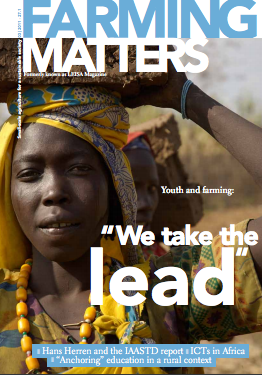 “WE TAKE THE LEAD”
“WE TAKE THE LEAD”
Farming Matters | 27.1 |March 2011 Did you know that we are in the International Year of Youth? We are, since 12 August 2010. This issue of Farming Matters shows that young people are, and have, the future in agriculture worldwide. It considers the roles, priorities and responsibilities of young generations. Read how they can contribute … Read more
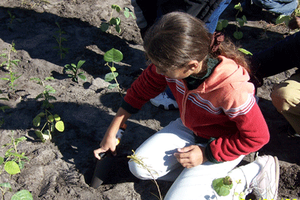 The starting point: Youth’s perceptions about sustainable agriculture
The starting point: Youth’s perceptions about sustainable agriculture
Theme overview: Researchers and politicians are increasingly recognising that young people have opinions about the problems facing the world, and that in many ways they are working to address them. Studies from different parts of the world show many similarities in the views of youth about sustainable agriculture and local food systems, regardless of ethnicity, … Read more
Editorial: Agriculture is sustainable if it can attract future generations of young farmers. But the overwhelming tendency of young people is to move out of farming, in search of a more comfortable life and better income. Does it mean that within the next few decades farming as a livelihood will cease to exist, and that … Read more
Francisco Caporal argues against changes in the Brazilian Forest Code. Industrial agriculture is expanding in order to remain competitive, and this growth does not consider environmental concerns. But the biggest worry today is that many persons and organisations are pushing for changes in the existing legislation – especially those laws and regulations which have proved … Read more
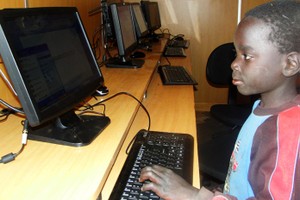 The many possibilities of ICTs in African agriculture
The many possibilities of ICTs in African agriculture
Communication is crucial in human interactions. The use of social media has become widespread, especially among young people. Modern communication tools can also be used to make agriculture more appealing and more effective. Though neglected for a long time, Information and Communication Technologies (ICTs) are now seen as an important tool for development, especially in … Read more
If there is one thing that the world food crisis has shown us it is that heavily relying on global food markets can be dangerous – especially for the urban areas and where households rely on imported food. This is a strong argument in favour of strengthening local and regional food systems. These are characterised … Read more
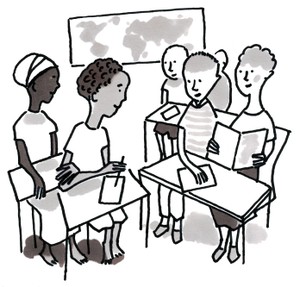 Learning about … Teaching around the globe
Learning about … Teaching around the globe
Edukans is a Dutch non-governmental organisation which aims to facilitate access to education, and improve its quality. Miet Chielens, one of its Programme Officers, explains that the organisation “aspires to give disadvantaged and marginalised children in developing countries a chance to build a better future for themselves and their society”. Miet Chielens, one of its … Read more
New books from The Worldwatch Institute, Friends of the Earth International, IFAD and others. Global food security: Ethical and legal challenges C.M. Romeo Casabona, L. Escajedo San Epifanio and A. Emaldi Cirión (eds.), 2010. Wageningen Academic Publishers, Wageningen. 532 pages. Read more Rural poverty report 2011. New realities, new challenges: New opportunities for tomorrow’s generation … Read more
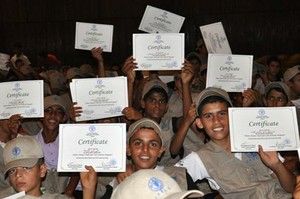 Meeting a region’s broad development needs
Meeting a region’s broad development needs
The Food and Agriculture Organization of the United Nations, FAO, works to raise levels of nutrition, improve agricultural productivity and the lives of rural populations, and to contribute to the growth of the world economy. The Gender, Equity and Rural Employment Division (ESW) supports FAO’s efforts to promote the economic and social well-being of the … Read more
Young professionals need to be engaged in shaping the future of agriculture, says Courtney Paisley, at YPARD. The first step in attracting future young professionals is nurturing the ones we have now. Furthermore, we need to provide more young role models for future agriculturalists to look up to and so change their perceptions of agriculture. … Read more

